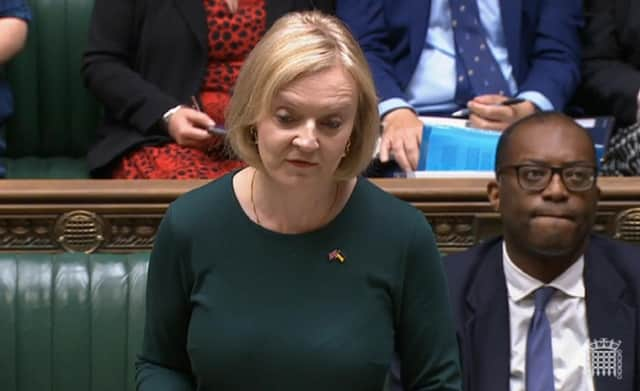Energy announcement offers little short-term sugar rush, and plenty of long-term problems


We don’t get free meals. No one gets paid to stay at home. All that happens, at the cost of more than £100 billion - about four per cent of our GDP - is that the country’s lights can stay on. Its care home residents won’t freeze to death. Swathes of business won’t be forced out of existence.
In other words, we don’t have much to show for it when the money’s all spent. Our bucks don’t get much bang.
Advertisement
Hide AdAdvertisement
Hide AdDespite estimates that 6.5 million households are already in fuel poverty, the price cap is effectively going up £500 next month, while inflation continues to rage. So in the short term, the problems get worse. It is a long way from a silver bullet.
In the long term, while an aim to become a net exporter of energy by 2040 may be laudable, opening the floodgates for fracking and dishing out 100 more oil and gas contracts in the north sea hardly tallies with what must be the dual priority of tackling climate change.
The fact the scheme offers neither immediate joy nor long term comfort is one of the problems for the new prime minister. The others are myriad.
Her brand from the outset, no doubt channelled from her ideological role model Margaret Thatcher is fiscal conservatism.
Advertisement
Hide AdAdvertisement
Hide AdDropping four percent of GDP in a day to intervene in a free market does not scream ‘low tax, small state.’
“We can’t tax our way to growth” - a mantra heard repeatedly today and no doubt plenty more before the next election - begins to look flimsy at best, and obtuse at worst.
It was deployed, in this instance, to deflect await from Labour’s claim that Treasury documents show energy producers expect to make excess profits of £170 billion in the next two years.
Taxing them, she said, was unpalatable. Taxes hamper growth.
Advertisement
Hide AdAdvertisement
Hide AdIt’s a perfectly reasonable opinion to hold, but if taxing energy companies hampers the growth of the country, why does asking taxpayers - and, let’s face it, their grandchildren - to foot the bill not hamper growth too.
How reasonable a position taxpayers find that to be remains to be tested.
Then there is the precedent it sets for the rest of her time in office. To acknowledge on her second full day that it is perfectly possible and prudent to borrow such vast amounts of money - that the ‘magic money tree’ in fact simply means issuing gilt bonds - leaves a Prime Minister who hopes to keep spending low in an unenviable position from the outset.
Because as soon as the next crisis is addressed - and they are plentiful in whichever direction one cares to look - it becomes increasingly difficult for the case to be made politically not to spend the money.
Advertisement
Hide AdAdvertisement
Hide AdTake the NHS, for example. There are many who would say waiting lists, ambulance waiting times and the chronic workforce shortages could be significantly improved with £120 billion. So why not borrow more for that?
Then there’s transport. And industrial disputes caused by stagnant pay. And disparities between the south and the north. Which of these wouldn’t benefit from such a gargantuan amount of money?
Her first challenge in office was never going to be a straight forward one. There were only ever likely to be losers.
But the sad reality is that vast though the sum is, it amounts to a sticking plaster which will only go so far in allaying fears of one of the most difficult winters in generations.
Comment Guidelines
National World encourages reader discussion on our stories. User feedback, insights and back-and-forth exchanges add a rich layer of context to reporting. Please review our Community Guidelines before commenting.